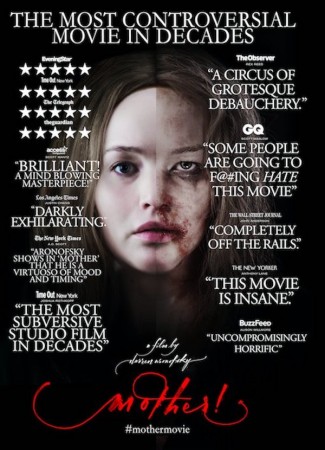MCN Curated Headlines Archive for September, 2017
“John Pollono was there revising the script, and then we brought in our script supervisor, our editor, Dylan Tichenor, and our cinematographer, Sean Bobbitt. Sean could see how the actors would engage or disengage with each other and come up with ways to shoot. He might say, “This is something we want to try close up,” or he might want to do a fluid master and never cut. Dylan might feel the emotional beat is coming too early, and we should hold longer, helping keep the audience in anticipation. Everyone had a voice.”
David Gordon Green On Collaboration On Stronger

“Sentimentality is probably the biggest enemy for the magazine business. You have to embrace the future.”
“The Not-So-Glossy Future of Magazines” As Longtime Editors Vamoose Vanity Fair, Time, Elle, Glamour, With Rolling Stone Soon To Follow

“Twenty years ago, 18 years ago, women routinely were encouraged to just watch their own behavior and other people who wanted to do inappropriate things or say inappropriate things and be inappropriate and leer and be lecherous without your permission, without your consent, the air in the room was more on the side of, ‘Well, you should watch what you do,’ not, ‘Don’t touch people without their consent. No means no.’”
Mid-Fantastic Fest, Sexual Assault Allegations Leveled Against Absent Harry Knowles
“Leaving aside the shade on the screen, which I have to do for my own sanity, the darkness of the image is an easily fixable problem that very few exhibitors seem interested in fixing: projectors with 3-D filters on the lens for non-3-D films. When you leave the 3-D filter on the lens while showing a non-3-D movie, it dramatically decreases the brightness of the picture. This has been a problem for years and no one in the industry seems to care.”
“If H’wd Wants A Scapegoat For Poor Ticket Sales, Blame Movie Theaters”
“How the fuck can MoviePass avoid bankruptcy — let alone expect to turn a profit — when the company hemorrhages money every time a subscriber sees more than six movies a month?”
Well, If You Put It That Way
“For me, ‘reality hunger’ is a dubious notion, because it tends to equate itself with the taste for the documentary, the desire for the flesh, for the ‘reality’ of reality shows. For me fiction doesn’t mean the invention of imaginary beings but the creation of a certain structure of rationality, a structure for presenting facts, characters and situations, for connecting events, let’s say. There is fiction everywhere, even in the news that we hear every day. So fiction in general is what creates a sense of reality.”
Jacques Rancière Thinks On Contemporary Movies
“Harry Dean, Harry Dean, you mean so much to us.”
Tom Charity On Harry Dean Stanton
“Nothing went into ‘The Handmaid’s Tale’ that people hadn’t done at some point in time, in some place.”
“Margaret Atwood, Canadian Queen Of Dystopia”
“Judi Dench’s face is incredibly expressive. There’s an enormous amount going on behind her eyes and Judi’s learned how to use that power because she’s such a fantastic actress. However you decide to shoot her, you know it’s going to be powerful. You just want to keep out of the way, really.”
Stephen Frears On The Daunting Deed Of Directing Judi Dench
“t is while discussing the difference between his stage persona and his day-to-day life that Marilyn Manson leans over and flicks me in the testicles. This comes as quite a surprise: I have encountered a lot of unusual things as a journalist, but have thus far managed to get by without an interviewee touching my genitals.”
Lede Of The Moment

“There was a rumor about me and an ex-girlfriend that felt ugly. They’re a complete fabrication and lie… [will] address the rumors on the other side of Fantastic Fest.”
Harry Knowles Also Exits Fantastic Fest

“Part of an overall political game that’s being played by big corporate media outlets to purge independents.”
THR Amplifies Couple Running The Latest Google Adwords-Shunned Russia Today-Favoring Website Ot Of Los Angeles

“As important as it is to call out obviously racist or insensitive casting choices, it is just as important to define what should be permissible when representing ethnicity onscreen and what isn’t really a problem and should not be dragged into this discussion.”
Producer Gavin Polone Asserts
“Movies don’t have to be just entertainment. Don’t ever pretend that they’re only distractions, only ephemeral, only ‘content’ designed to generate money and nothing else. Don’t ever pretend that they can’t change the way you see the world, the way you see yourself, or the way you see others. Don’t ever pretend that movies don’t matter.”
Screenwriter Geoff LaTulippe On The Big Sick
 Key Art For Paramount Campaign For Mother! Using Negative Reviews May Prove Controversial
Key Art For Paramount Campaign For Mother! Using Negative Reviews May Prove Controversial
And – “While I have a hard time buying (or stomaching) Aronofsky’s comparison of his own work to that of the great Luis Buñuel—specifically, as a variation on The Exterminating Angel, ith its room full of existentially trapped partygoers switched out for a house party whose revelers can’t take a hint to leave—it’s true that Buñuel was an early adopter of the strategy of using conspicuously glamorous actresses as bait for works with can-of-worms qualities.”
“Negotiating to get onto the set required more back-and-forth than a Voight-Kampff test. I’m told I’m the only US journalist who passed.”
Wired Goes Behind The Scenes With BR2049










